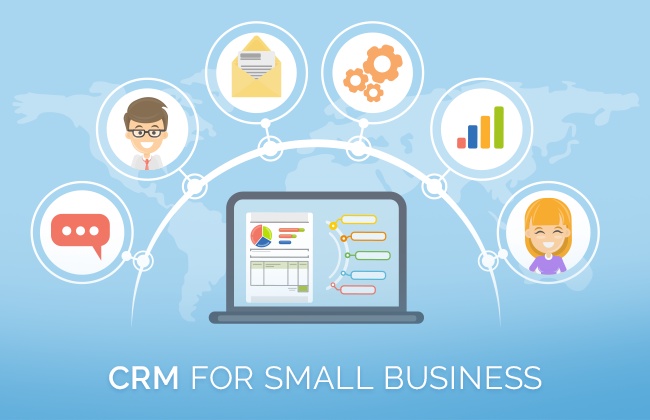In the modern business landscape, where competition is fierce and customer expectations are constantly evolving, small businesses face unique challenges in managing their customer relationships effectively. Customer Relationship Management (CRM) software has emerged as a powerful solution for small businesses looking to streamline their operations, enhance customer experiences, and drive sustainable growth. In this comprehensive guide, we'll explore the importance of CRM software for small businesses and how it can help them thrive in today's dynamic market.
1. **Centralized Customer Data Management:**
One of the primary benefits of CRM software for small businesses is its ability to centralize customer data in a single, accessible platform. Instead of scattered spreadsheets, email inboxes, and paper records, CRM software provides a unified database where businesses can store and organize customer information, including contact details, purchase history, preferences, and interactions. This centralized approach enables small businesses to gain a holistic view of their customers and deliver personalized experiences across all touchpoints.
2. **Improved Customer Engagement:**
CRM software empowers small businesses to engage with their customers more effectively by providing tools for targeted communication, personalized marketing campaigns, and timely follow-ups. With CRM, businesses can segment their customer base based on demographics, behavior, or purchase history and tailor their messaging accordingly. By sending relevant offers, recommendations, and updates to customers at the right time, businesses can nurture relationships, build loyalty, and drive repeat purchases.
3. **Streamlined Sales Processes:**
For small businesses with limited resources, optimizing sales processes is crucial for maximizing efficiency and closing deals faster. CRM software automates repetitive tasks such as lead capture, lead scoring, and follow-up reminders, freeing up sales teams to focus on high-value activities like prospecting and relationship building. Additionally, CRM systems provide visibility into the sales pipeline, allowing businesses to track opportunities, forecast revenue, and identify bottlenecks in the sales process.
4. **Enhanced Customer Service:**
Exceptional customer service is a cornerstone of small business success, and CRM software plays a key role in delivering it consistently. By centralizing customer interactions, inquiries, and support tickets, CRM systems enable businesses to respond to customer inquiries promptly, resolve issues efficiently, and provide personalized support experiences. Furthermore, CRM software can automate service workflows, route tickets to the appropriate teams, and escalate urgent issues, ensuring that no customer request falls through the cracks.
5. **Data-Driven Decision Making:**
In today's data-driven business environment, small businesses need access to actionable insights to make informed decisions and drive strategic growth initiatives. CRM software provides robust analytics and reporting capabilities that allow businesses to track key metrics such as customer acquisition costs, customer lifetime value, churn rates, and sales performance. By analyzing this data, businesses can identify trends, uncover opportunities, and optimize their strategies to achieve better outcomes.
6. **Scalability and Flexibility:**
As small businesses grow and evolve, they need technology solutions that can scale with them and adapt to changing needs. CRM software offers scalability and flexibility, allowing businesses to customize their systems, add or remove features as needed, and accommodate increasing data volumes and user requirements. Whether it's adding new users, integrating with third-party applications, or expanding into new markets, CRM software provides the flexibility small businesses need to support their growth trajectory.
7. **Improved Collaboration and Communication:**
Collaboration and communication are essential for small businesses to operate efficiently and deliver cohesive customer experiences. CRM software facilitates collaboration among teams by providing a centralized platform for sharing information, collaborating on projects, and coordinating activities. With features such as shared calendars, task assignments, and real-time messaging, CRM systems break down silos and promote cross-functional collaboration across sales, marketing, and customer service departments.
8. **Competitive Advantage:**
In today's competitive marketplace, small businesses need every advantage they can get to stand out from the competition and win over customers. CRM software provides a competitive advantage by helping businesses deliver personalized, responsive, and memorable experiences that differentiate them in the minds of their customers. By leveraging CRM technology to understand customer needs, anticipate preferences, and deliver exceptional service, small businesses can gain a competitive edge and drive long-term success.
9. **Cost-Effective Solution:**
Contrary to popular belief, CRM software is not just for large enterprises with deep pockets. Many CRM solutions are specifically designed with small businesses in mind, offering affordable pricing plans, flexible payment options, and scalable features. By investing in CRM software, small businesses can achieve significant cost savings by streamlining operations, reducing manual tasks, and maximizing the productivity of their teams.
10. **Future-Proofing Your Business:**
In an era of rapid technological innovation and digital disruption, small businesses must adapt and embrace new tools and technologies to stay competitive and future-proof their operations. CRM software represents a strategic investment in the future of your business, enabling you to stay ahead of the curve, anticipate customer needs, and pivot quickly in response to market changes. By adopting CRM software, small businesses can position themselves for long-term success and sustainability in today's dynamic business landscape.
In conclusion, CRM software is a game-changer for small businesses looking to thrive in today's competitive market. From centralizing customer data and improving engagement to streamlining sales processes and enabling data-driven decision-making, CRM software offers a wide range of benefits that can help small businesses succeed and grow. By investing in CRM technology, small businesses can unlock new opportunities, drive operational efficiencies, and build stronger, more profitable customer relationships that drive long-term success.


No comments yet